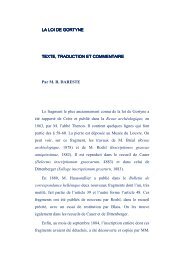CYPRIOT GRAMMAR
CYPRIOT GRAMMAR
CYPRIOT GRAMMAR
You also want an ePaper? Increase the reach of your titles
YUMPU automatically turns print PDFs into web optimized ePapers that Google loves.
Υγω -> υκω<br />
Φ -> χ<br />
Φθ -> φτ<br />
Φλ -> βλ<br />
Φρ -> βρ<br />
Χλ -> γλ<br />
Χρ -> γρ<br />
Χ -> φ<br />
Between vowels:<br />
βρ -> ρβ<br />
πρι -> πιρ<br />
κρι -> κιρ<br />
ρ-λ -> λ-ρ<br />
β, γ, δ, σ -> Dropped<br />
Explanation for the changes in pronunciation and aplology of Greekcypriot words<br />
Many fellow Greek Cypriots like many of their mainland Greek counterparts are often obsessed with keeping to the closest Ancient Greek<br />
forms of words. However this does not mean that the Ancient Greek taught in classes all over the world is actually what was spoken by all<br />
Greeks in Ancient times.<br />
In fact the Ancient Greek taught today is itself a Greek dialect, the dialect that Greeks in Attica spoke. And this was simply one of the<br />
many other dialects (Doric, Ionic, Aeolic, Northwestern, Achaean, Macedonian, Homeric, Pamphylia) spoken by Ancient Greeks throughout<br />
the Hellenic world of ancient times. Arcadocypriot, which was spoken both in Cyprus and Arcadia in Peloponnesus, differed considerably<br />
from Attic Greek. However this did not make Arcadocypriot or for that matter any other dialect of ancient Greek any less Greek or ancient<br />
compared to Attic!<br />
Koine Greek whose Greek Cypriot is a dialect was actually the dialect of Ancient Greek spoken by the soldiers of Great Alexander which<br />
later became standard throughout the Hellenic-speaking world and which later (330AD) developed into Medieval Greek, the official<br />
language of the Eastern Roman Empire, which in turn became Modern Greek.<br />
In addition the Greeks of Cyprus influenced by both the Eteocypriot (spoken on the island until the 4 th century BC), Koine Greek and its<br />
extremely strong ties with Egyptians, Persians and Phoenicians (1 in every 17 men in Cyprus has a Phoenician descent) already used<br />
fricative vowels (j, sh, zh) in their dialects even before the foreign rule of Arabs, Venetians, Genoese, Turks, English etc. There are attested<br />
examples of these in ancient scripts.<br />
Moreover Greeks in Cyprus lived under a rather warmer climate than Mainland Greeks with frequent droughts. All languages formed in<br />
warm climates contain a large collection of vowels in their words and fricative consonants which is a strong characteristic of Greek Cypriot.<br />
The reason behind this is that such languages aid in the better ventilation of the body (exhaling warmer air and inhaling colder from the<br />
outside) in response to the warmer climate.<br />
In order for you to understand this better let’s use a practical example. Place your palm under your nose and try saying the following<br />
word ‘heerokteeon’’ (Ancient Greek for glove). Did you feel the slight breeze of air on your palm? Now try saying the word ‘sherofteen’<br />
(Greek Cypriot for glove). The air exhaled for the pronunciation is considerably more which helps for better ventilation in warmer climates<br />
and thus explains why words in Cypriot Greek use fricatives like ‘sh’ instead of ‘h’ and ‘ft’ rather than ‘kt’. For the same reason Greek<br />
Cypriot has retained the original Ancient Greek pronunciation of ππ, λλ, μμ etc (pronounced as double letters) which in Modern Greek did<br />
not survive due to the colder climates while in other cases it dropped single vowels like ‘δ’ (dh) e.g. Παιχνίδι -> παιγνίιν because in order to<br />
pronunounce ‘δ’ you have to stop the circulation of air. Another example of this phenomenon involves the letter ‘θ’. For example the verb<br />
‘θέλω’ (to want) became ‘χιέλω’ and the verb ‘θυμάμαι’ (to remember) became ‘αττυμούμαι’ because it both cases the burst of air is<br />
greater.<br />
The point of this section it to give a logical explanation to the morphological changes words in Greek Cypriot have received and in order<br />
to make it clear that they are not irrational or decayed and especially not pronunciations of uneducated and stupid people. Simply in<br />
warmer climates the part of brain that controls speech is changed accordingly to help with the ventilation under the influence of the<br />
mechanism of environmental adaptation. Therefore these changes are simply natural and have a history. They should be embraced for<br />
what they are and should help us understand that heerokteeon is just as good as sheerofteen. Denying the variations in Ancient Greek is to<br />
deny the asset of diversity of a civilization which came into being from the beginning of its existence.<br />
5





